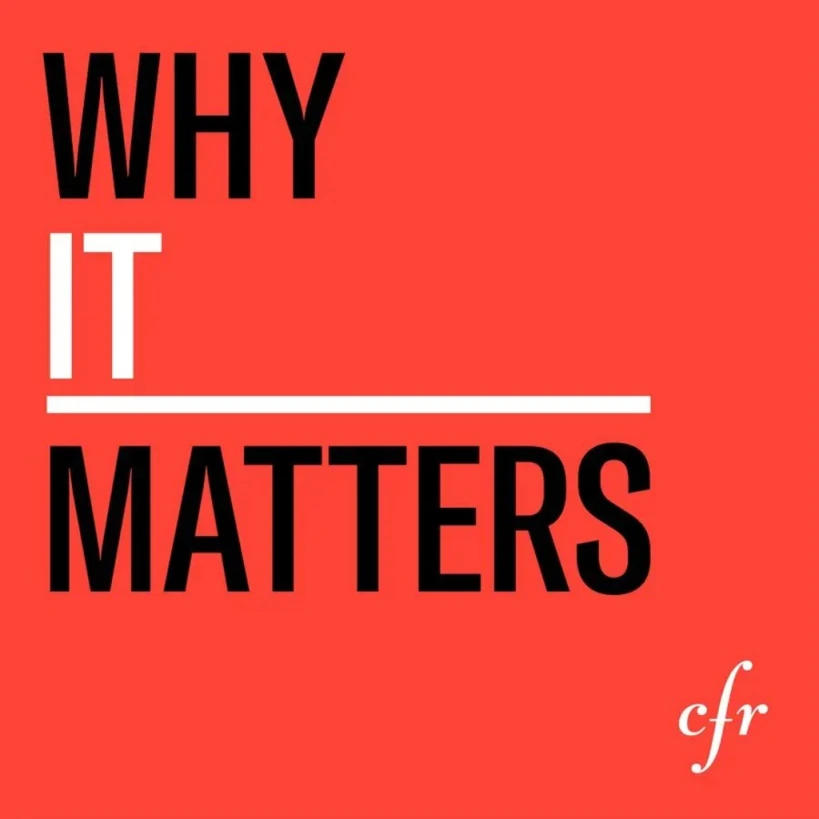WhatsApp With India?
Roughly four hundred million people in India use the encrypted messaging platform WhatsApp. Now, the country’s ruling party is trying to force WhatsApp to let the government trace and censor messages. The outcome could change digital freedoms in the world’s largest democracy, and could have strong implications for the future of privacy everywhere.
Published
Host
- Gabrielle SierraDirector, Podcasting
Author
- Chinmayi ArunResident Fellow, Yale University
- Vindu GoelTechnology and Business Reporter, The New York Times
- Seema ModyGlobal Markets Reporter, CNBC
Supervising Producer
- Asher RossLead Content Strategist
Audio Producer and Sound Designer
- Markus ZakariaAudio Producer & Sound Designer
Associate Podcast Producer
- Rafaela Siewert
Senior Producer
- Jeremy SherlickDirector of Video
Show Notes
When social media causes real-life dangers, what role should the government play in regulating it? This question is being asked around the world; in India, a decisive moment has arrived. The ruling Bharatiya Janata Party (BJP) is seeking to trace and censor private digital communications in the name of national security. Standing in its way is WhatsApp, an American-made, encrypted messaging platform that has become a daily mode of communication for hundreds of millions of Indians. Critics say the BJP’s push is part of a broader consolidation of power and a shift toward ethnonationalism. The digital freedoms of the country’s 1.3 billion people could hang in the balance.
From CFR
“Kashmir: What to Know About the Disputed Region,” Lindsay Maizland
“Hate Speech on Social Media: Global Comparisons,” Zachary Laub
“Modi’s Thumping Mandate—but for What?,” Alyssa Ayres
Read More
“India Adopts the Tactic of Authoritarians: Shutting Down the Internet,” New York Times
On Kashmir
“What Is End-to-End Encryption? Another Bull’s-Eye on Big Tech,” New York Times
Watch or Listen
“India’s WhatsApp dilemma,” Al Jazeera
“How rumors on WhatsApp led to a mob killing in India,” Washington Post
Transcript
Hey everyone, a quick note before we start the show. So some of our colleagues produced this amazing online presentation about the international refugee crisis, and it’s been nominated for a Webby this year. I encourage you to check it out and if you like what you see, please vote for us. Voting closes on May 7th. So go to Vote.WebbyAwards.com and search for it by its title “No Refugee.” And thanks!
Ah, social media. Love it or hate it, we use it for almost everything. Staying in touch, buying things we need, buying things we don’t need, following the news, even checking in during a disaster.
But entrusting these platforms with our information comes at a cost. The boundaries of our privacy have faded, and more and more we find ourselves asking, who’s in charge? Is it legislators? Is it the platforms themselves? In the U.S. the answers to those questions are unclear.
But in India, a potentially decisive moment in digital freedom is going down right now. India’s ruling party has put forward new rules that would allow it to trace and censor private communication. Standing in its way is WhatsApp, an American-made, encrypted messaging platform that is used by hundreds of millions of Indians. And the outcome could have ripple effects across the globe.
I’m Gabrielle Sierra, and this is Why It Matters. Today, India’s government versus WhatsApp, and the looming threat of digital authoritarianism.
Vindu GOEL: India is the world’s largest democracy. If you can imagine, 900 million people voted in the last national election last year. Out of a population of 1.3 billion people, it’s just a massive exercised election.
Seema MODY: Yeah, it’s huge, it’s populous, and that’s what also makes it really fun and exciting to be on the ground. You certainly feel the energy, especially in a city like Mumbai.
GOEL: Politicians routinely insult each other on the campaign trail, criminals of every flavor run for office and win, so do Bollywood movie stars, cricket stars. It just never ends.
Chinmayi ARUN: India has always been a fairly chatty democracy. We talk a lot, we argue a lot, that’s our culture.
Gabrielle SIERRA: Okay so help me understand why WhatsApp is such a big deal in India? How many people are actually using it there?
ARUN: Roughly 400 million.
SIERRA: That’s a lot of people.
ARUN: It is indeed.
This is Chinmayi Arun, she is a resident fellow at Yale University, and the founder of a research center at National Law University in Delhi. She’s also a leading legal expert on the intersection between freedom of speech and technology.
SIERRA: And so why WhatsApp? Why not, you know, Instagram, or Snapchat?
ARUN: The elite platforms are used by everyone, but WhatsApp is the one that really appeals to people. If you have a phone that’s not too fancy, if you don’t speak English, you don’t read, or you don’t have access to an expensive data connection, you can still use WhatsApp. So it started with, “Hey, you don’t have to spend one rupee or two rupees per text, you just save them up and then they send whenever you’re in Wi-Fi.” And so a lot of people with not a lot of money, which is many, many Indians, decided that this works for them. And then WhatsApp had these multimedia features which people started using and started liking. And I have mixed feelings about this because the good thing is that I get to talk to my grandma, and she finally has forgiven me for moving across the Atlantic, she can look at my home and say things about my plants or whatever.
SIERRA: Of course.
ARUN: But if you’re sitting in an Indian airport and watching the number of people who do video calls, they sort of subject you to their conversations. Mixed feelings.
GOEL: WhatsApp is really a messaging platform, and that can be one-to-one messages like me sending a message to you, but it’s also very commonly used in India for groups.
I am Vindu Goel, and I am a technology reporter for The New York Times based in Mumbai, India.
Vindu also covers Indian economics and culture, and has written extensively about free speech and misinformation under India’s ruling party. We called him at his home in Mumbai on WhatsApp.
GOEL: WhatsApp has become so embedded in life in India that people use it in their business transactions, so you can order groceries from your corner grocery store over WhatsApp. I buy an airline ticket from MakeMyTrip, which is one of the big online travel agencies. They send me a confirmation message on WhatsApp with my E-ticket details.
For those of us based outside of India, handling a basic transaction may require a few different platforms. You find out about a concert on Instagram, RSVP for it on Facebook, maybe share the notification on Twitter, buy your ticket on Ticketmaster, and receive the confirmation on Gmail. But for Indians, WhatsApp is often the one-stop-shop for everything.
In other words, an application from Silicon Valley has become basic infrastructure for the second-most populous nation on Earth. That’s a pretty big deal, and it helps illuminate why the government is pushing for greater control.
GOEL: WhatsApp was founded in 2009 by two former employees of Yahoo, it’s an American company, it was founded in Silicon Valley, and they basically built a very simple messaging service. It became very popular, and it caught the attention of Mark Zuckerberg, the chief executive and founder of Facebook. Zuckerberg decided in 2014 to buy WhatsApp and pay the still astonishing price of $22 billion for this messaging company.
SIERRA: Yikes. That’s a lot.
GOEL: It’s a lot.
LA Times: 0:05 - 0:10 Facebook is making a mobile push with its deal to buy real-time messaging service, WhatsApp.
CNN: 1:03 - 1:07 It’s still an incredible price to pay for a company that’s just a few years old.
ABC News: 1:34 - 1:44 It also makes tiny WhatsApp more valuable than some of the most established companies in the country, including American Airlines, Marriott Hotels, and Xerox.
MODY: And it came at a crucial moment for Facebook when it really was trying to find ways to diversify its revenue base, and also get in touch with more mobile users.
I’m Seema Mody, Global Markets Correspondent with CNBC Business News.
And suddenly came this messaging platform that was not only gaining prominence here in the U.S., but around the world. In fact, I believe that the average daily user rate on WhatsApp was much higher than Facebook Messenger. Facebook saw that and said, “this is such a strategic bet for us, let’s acquire it and find a way to really incorporate it into our user base and our platform.”
SIERRA: But WhatsApp is free, right?
MODY: WhatsApp is free and I think this is still a developing story to see how Facebook is really trying to incorporate WhatsApp into its business, and will you one day see ads on WhatsApp? That’s certainly been one of the big questions.
GOEL: Zuckerberg was prescient in that this technology of a very simple messaging app was going to become very popular. Today, WhatsApp has more than two billion users around the world. It is by far the most popular messaging app in the world, and one of its biggest claims to fame is it emphasizes privacy. All messages on the service use something called end-to-end encryption.
Okay so, in most cases when you send an email, or a text message, it gets encrypted. That means that the information inside is locked up in a code, so that outsiders can’t read it. However, the service providers that pass your message along can read it - whether that’s Apple, or Gmail, or Facebook, whoever. They all have the keys to that code. And that makes your message vulnerable.
Enter end-to-end encryption. With this technology, none of the middlemen have the keys. Only you and the person you are sending it to can break the code.
GOEL: WhatsApp can’t read it, even if the government came knocking at the door of WhatsApp, WhatsApp would have nothing really to give them, and so your information is private.
SIERRA: And that makes it unique to other services, messaging services, like, whether you’re sending a text message, or even Facebook Messenger where that information does live somewhere.
GOEL: Yeah. Most other messaging services in the world are not end-to-end encrypted, and certainly none of the really popular ones. But WhatsApp has made it really easy, you don’t have to think about encryption. It just is encrypted.
Because so much of India’s communication happens on WhatsApp, end-to-end encryption has made it very difficult for the government to investigate messages, in the name of national security.
ARUN: People are not making phone calls anymore. They’re not even walking over to their neighbor and saying things, they’re just texting them. And where there is speech, there is harmful speech.
It’s not news that social media can bring out the worst in people. The platforms we use every day are teeming with sexism, racism, misinformation, and violent ideologies.
It’s the same in India, where social media has amplified problems that are a lot older than the Internet.
PBS NewsHour: 0:00 - 0:06 Rumors and lies spread like wildfire across the internet, including across chat applications like WhatsApp.
Al Jazeera: 2:13 - 2:20 There are many first time users in India who think that whatever comes in their WhatsApp inbox, is true.
ARUN: The one that’s really made the headlines is that there was a lot of vicious hate speech circulating on WhatsApp. So for example, the Muslim community is under quite a lot of pressure in India right now and it’s really sad. One of the ways in which they’re discriminated against is that some upper-caste Hindus, don’t eat beef. And so the rumor circulating on WhatsApp will say things like, “X has beef in his fridge.” Or, “Y is his transporting a cow carcass.” And since it’s already been sold to people as a threat to their religion, when a rumor like that reaches people that already feel threatened, and feel like these people are out to get all the Hindus, and they’re trying to destroy our religion by eating beef, and lynch mobs attack them.
SIERRA: Wow.
ARUN: And they’re popularly called the WhatsApp lynchings.
GOEL: In early 2018, there was a wave of false messages on WhatsApp about child kidnappers prowling various parts of India trying to steal people’s children, and this panicked a lot of people and mobs attacked strangers in various parts of India and killed them. Beat them to death, tied them up, hung them, all kinds of terrible things. More than 20 people died in just a span of a few months because of these rumors. And after these rumors started appearing, the central government, went after WhatsApp and said, “You need to find a way to trace these messages and stop these messages.” And this set up a feud with WhatsApp that has still not been resolved.
The government says it doesn’t want to read your messages, the government says they don’t want to spy on the content of messages. They’re not asking WhatsApp to break the encryption of messages and just show them what’s in the messages, but what they are saying is, “You need to be able to trace back the pathway of a message, and you have to find a way to do that because if some message goes viral, we want to find out who sent it.” And we’ll see what happens. I mean, WhatsApp has said that to do that would require significant changes to their service and they haven’t said whether they’d be willing to make such changes to their service.
And that brings us back to the rule changes that the Indian government is proposing. The draft hasn’t been finalized, but the current language would require platforms such as Facebook, Instagram, WhatsApp, TikTok, and others to remove unlawful posts, and trace their origins within 72 hours of a request.
This sounds pretty reasonable. If misinformation on a private social media platform is leading to real-life violence, the need to have an authority step in and offer regulation seems like a rational impulse.
Still, context matters, and before we go any further, it’s probably a good idea to learn a bit more about India’s ruling party, popularly known as the BJP, which some critics have described as authoritarian and ethno-nationalist.
SIERRA: Can you tell me a little bit just about the ruling party in India, and how they interact with social media?
ARUN: So, the ruling party in India was known for their use of social media, modeled on the Obama campaign, by the way. And so there’s a part of it in which they’ve been much lauded for taking to the social media and sort of modernizing Indian politics that way. It’s also known for a huge rise in the number of Internet shutdowns. So it’s interesting because they take pride in being accessible to people on social media, but at the same time, are quite controlling of it.
SIERRA: It sounds like they know how powerful it is.
ARUN: Yes, it does.
SIERRA: So, what do you mean by Internet shutdowns? Like, they’re just completely shutting down access to everybody in a certain place for a certain amount of time?
ARUN: Yes, what I mean by an Internet shutdown is, a shutdown of all Internet services, but typically also telephone services, so basically it’s a full communications shutdown.
SIERRA: That’s crazy, and scary. And how do people react to something like that?
ARUN: Fury, mostly. My colleagues and I have been tracking this from when it started in Kashmir years ago. For the Kashmiris, it’s terrible, because they’re stuck completely cut off from the rest of India and from the rest of the world.
The story of Kashmir could take up an episode on its own. We don’t want to oversimplify, so check our show notes for the full story. Kashmir is a Muslim-majority region between India and Pakistan that the two nuclear states have been fighting over since 1947. Tensions have led to war four times already. In order to tamp down dissent, the BJP shut down the Internet in Kashmir for more than 200 days. This is just one example of how far they’re willing to go in order to control the flow of information online.
GOEL: The BJP is very good at winning elections, and one of the skills that it’s really mastered is how to use social media to disseminate misinformation. They have factories, people who are essentially creating content to put out every day. Some of it’s true, some of it’s false, some of it’s half true. There’s a certain irony about a BJP-led government seeking help from WhatsApp to crack down on misinformation when, in fact, the very same government is the source of much of the misinformation that moves on WhatsApp.
SIERRA: So, you don’t buy the argument that the only reason the government wants traceability is to stamp out dangerous disinformation?
GOEL: No. The Indian government has used surveillance against dissidents in Kashmir. People widely believe that cell phones are tapped, that SMS messages are being read by the government. There’s a huge sort of black budget for various kinds of surveillance operations that the government does, and they do it in the name of national security, they say they’re finding terrorists, much like the United States government that does a lot of surveillance in the name of national security. And the laws are quite broad in India. It essentially gives the government the right to do surveillance for pretty much any reason it pleases, and so no one really trusts that it would only be used for good and noble purposes.
Watchdogs in India have been concerned about the constitutional right to privacy for a long time. Some critics see the latest push by the BJP as part of a larger consolidation of power and a shift towards a Hindu nationalist agenda. They’re concerned that new surveillance tools will be used in discriminatory ways.
GOEL: The request that WhatsApp provide a way to trace messages as part of a broader set of rules that the Indian government wants to impose on internet companies, these rules would also require companies to more closely monitor for certain kinds of content, would give the government power to require the removal of content that it considered threatening to the state or public order, a variety of rather open-ended justifications. And so the risk, the concern that a lot of people have is that essentially this will give the government the power to censor anything at once and force the internet companies to comply.
SIERRA: So, in response, has WhatsApp done any other things? Have they made other moves to sort of placate this request and say, look, we’re taking care of this misinformation that is truly leading to people dying?
GOEL: Yes. So, one step they took was to limit the number of people or groups you could forward a message to, to five. People would get some exciting message or people would get some threatening message and say, “I need to let everybody I know, know about this,” without really thinking about whether it’s true or not, or knowing, and then all of a sudden this forward shows up and you don’t really know where it came from, and it goes viral. And so the idea was to slow the speed, slow the dissemination. And they tested that in India and they found it worked so well that they’ve now rolled it out globally.
In fact, since we interviewed Vindu, WhatsApp has made further restrictions. When a user receives a message that has already been forwarded five times, they can now only send it to a single person or group. The changes are aimed at stemming the flow of viral misinformation about COVID-19.
SIERRA: I mean, it sounds like WhatsApp is making efforts to address these issues just without breaking encryption. That seems to be the main thing that they’re refusing to do at this point.
ARUN: So far. I believe that they’re now under pressure to break encryption also. And that’s why I said they’re in a hard place, because if it comes to that, if it comes to either leave the country or break encryption, the question is, are they going to give up all the big money, the big market, or are they going to break encryption?
SIERRA: So, what will happen if WhatsApp refuses?
ARUN: So I think if you asked WhatsApp the answer to this question, they’ll say, “Well, another player will move in.” I don’t think that it’ll be as easy or as smooth, because WhatsApp offers functionality that not all platforms do. And the second thing we don’t know, because WhatsApp has never tried it, is that how far will the public be okay with this? So if you tell the Indian public that, basically, the Indian government said enable surveillance or leave, and therefore none of you have WhatsApp anymore in this enormous country with fairly rebellious people. It would be interesting to see how that lands.
SIERRA: So, what is at stake for Indians as this all plays out?
ARUN: One is that it kills all the wonderful things that the Internet brought to India. All the young women that learned to rebel quietly. The organizing, people who learned because they were a part of WhatsApp groups that helped educate them, as I told you in the beginning, human communication moved to WhatsApp. And the thing is that India has always been a fairly chatty democracy. We talk a lot, we argue a lot, that’s our culture. Amartya Sen’s written about it, and he said, “We didn’t need free speech to create public discourse in India. It was always a thing. We were always arguing and talking.” And we’ve never had a state that’s been able to monitor that end-to-end. Now that our communication’s moved online, and one private company holds it all, if that private company chooses to share that communication with the government for the first time possibly in Indian history, the Indian government will be able to conduct mass surveillance in India. And so the question is, what will that do to both the Indian formal democracy, but also the democratic spirit of India.
GOEL: If there is censorship on a wide scale you’re really going to see a weakening, perhaps crushing over time, of that democratic spirit. India will move more in the direction of China where the government decides which information gets out there, and every once in a while somebody finds a way around the censors and posts information that the government doesn’t want them to post. That’s the risk with India, is the government becomes the source of information and you lose some of these other sources of information.
As a reminder, there are 1.3 billion people living in Indians. 1.3 billion people whose freedoms could be eroded. And the decision that goes down in India won’t just stay there. It could shape the digital freedoms of people all across the world in the years to come.
GOEL: So, the precedent that this would set, if WhatsApp added traceability, is India would not be the only country to ask. Other countries would ask. Once it’s there, anybody can ask for it.
ARUN: It could be the beginning of a movement. And so, Pakistan has introduced a new draconian law recently that appears to be modeled on the Indian one. In fact, my Pakistani friends and I joke that our countries sometimes borrow the worst ideas from each other. So there’s that. There’s Kenya, that used India’s digital ID system, and may feel like they can do this too, with WhatsApp. I believe that Israel and Brazil have also had what they might term as “WhatsApp problems.” And so, you might have a copycat situation, of many countries‘ authoritarian rulers feeling that, “Well, if WhatsApp gives way here, it will give way in my country too.” So that’s the digital rights problem, that it could spread, and you end up with authoritarian countries around the world, and that’s dangerous for everyone.
It’s still unclear how and when the new rules will be implemented, but the twist is that a big part of the outcome rests in the hands of a private American company. WhatsApp could comply with the request, they could attempt to negotiate and compromise, or they could just refuse, and see whether the Indian government would truly push them out of the country.
MODY: I think when you’re that big, you do inherit some level of responsibility to set the standard and ensure you’re not just trying to monetize a country’s populous nation, and instead are coming in to try to really work with the country, to do the right thing. I think as a company, you could argue, if they come into a foreign country, they should be trying to do more good than bad. And it’s interesting, if you look at the CEOs of some of the most powerful tech companies in the last two years, the number of trips individuals like Mark Zuckerberg, Tim Cook, Jeff Bezos have taken to India to spend time with Prime Minister Modi and really try to build up their personal relationship with the Indian leader, I think it just speaks to how much they see India as such a big opportunity, but also to the big challenges they’re facing on the ground.
SIERRA: But the ultimate draw is just the market size?
MODY: I think that’s exactly what it is. 1.3 billion people, half of which are under the age of 25. These companies see this as a huge opportunity, especially at a time when China’s economy is slowing down, you look at India as that next big bet in Asia.
GOEL: I think that all of these companies have become very powerful. We use their services, we trust lots of information to them. Sometimes they treat it with great respect, sometimes they abuse that trust, and people are distrustful of the tech companies as much as they’re also distrustful of the government. Tech firms need to figure out how to address some of these very real concerns raised by governments without fundamentally altering the nature of the product. I’m not sure it’s possible. The attitude in Silicon Valley for a long time was, “We’re not going to help. We don’t want to help.” Twitter quite famously called itself the free speech wing of the free speech party. They don’t say that very much anymore, because it’s complicated, right? So, Twitter became this cesspool of trolls and attacks and all kinds of nasty stuff, and they were losing users and they had a bad reputation among a lot of people and they realized that they have to figure out how to draw lines. But where do you draw the lines? There’s no easy solutions. This technology has in many ways gone out of control, no one can really control it, even the companies themselves have trouble controlling how it’s used.
SIERRA: Right. I mean in an ideal world if every government was just perfect and amazing and benevolent, of course they should be a part of this, and of course they should be helping monitor something that is so out of control, but you can’t trust that everybody has the best interests at heart and wouldn’t take advantage of a situation. And it sounds like there’s just no easy answers for these things.
GOEL: No. I mean, these are democracies, right? Autocracies are even worse, but even in a democracy, even in a democracy like India, a democracy like the United States, there’s always an opposition, and whoever’s in power is going to be tempted to use these tools to hurt the opposition. It’s just the nature of politics and the nature of temptation.
Our freedoms are increasingly expressed and exercised online. And by concentrating our freedom of speech online, we have also made it more susceptible than ever before to surveillance and censorship.
Nobody knows the right way to deal with this, and the argument is being hashed out, in different ways, all over the world.
Soon we’ll hear what the world’s biggest democracy has to say.
As we mentioned throughout the episode, there is a whole lot more to learn about India, WhatsApp, and everything else that plays into this complex topic. So visit CFR.org/Whyitmatters and take a look at the show notes, we added a bunch of really great stuff to take a deeper look.
Interested in saying hi to the Why It Matters team? Send us an email at [email protected].
Be sure to subscribe to the show on Apple Podcasts, Spotify, Stitcher, or wherever you get your audio. And if you like the show, leave us a review!
Why It Matters is a production of the Council on Foreign Relations. The show is created and produced by Jeremy Sherlick, Asher Ross, and me, Gabrielle Sierra. Our sound designer is Markus Zakaria and our assistant producer is Rafaela Siewert. Robert McMahon is our Managing Editor, and Doug Halsey is our Chief Digital Officer.
Original music is composed by Ceiri Torjussen. Special thanks go to Richard Haass, Jeff Reinke, and Alyssa Ayres.
For Why It Matters this is Gabrielle Sierra signing off. See you next time!






